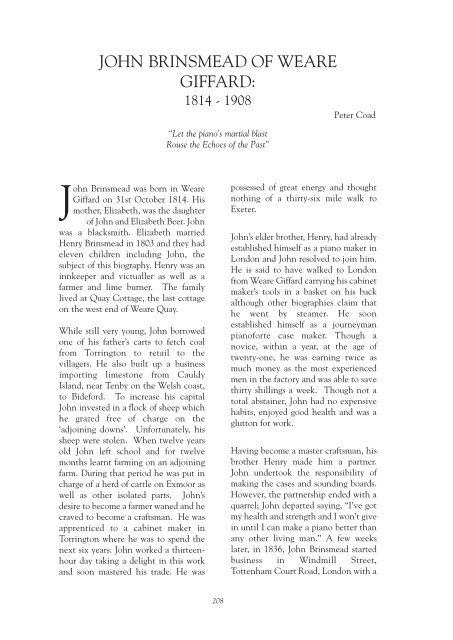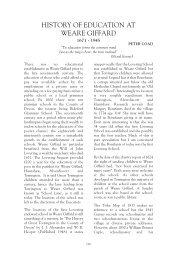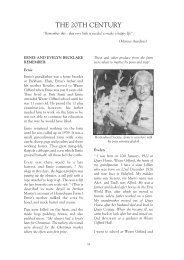John Brinsmead - Weare Giffard
John Brinsmead - Weare Giffard
John Brinsmead - Weare Giffard
Create successful ePaper yourself
Turn your PDF publications into a flip-book with our unique Google optimized e-Paper software.
JOHN BRINSMEAD OF WEARE<br />
GIFFARD:<br />
1814 - 1908<br />
Peter Coad<br />
<strong>John</strong> <strong>Brinsmead</strong> was born in <strong>Weare</strong><br />
<strong>Giffard</strong> on 31st October 1814. His<br />
mother, Elizabeth, was the daughter<br />
of <strong>John</strong> and Elizabeth Beer. <strong>John</strong><br />
was a blacksmith. Elizabeth married<br />
Henry <strong>Brinsmead</strong> in 1803 and they had<br />
eleven children including <strong>John</strong>, the<br />
subject of this biography. Henry was an<br />
innkeeper and victualler as well as a<br />
farmer and lime burner. The family<br />
lived at Quay Cottage, the last cottage<br />
on the west end of <strong>Weare</strong> Quay.<br />
While still very young, <strong>John</strong> borrowed<br />
one of his father’s carts to fetch coal<br />
from Torrington to retail to the<br />
villagers. He also built up a business<br />
importing limestone from Cauldy<br />
Island, near Tenby on the Welsh coast,<br />
to Bideford. To increase his capital<br />
<strong>John</strong> invested in a flock of sheep which<br />
he grazed free of charge on the<br />
‘adjoining downs’. Unfortunately, his<br />
sheep were stolen. When twelve years<br />
old <strong>John</strong> left school and for twelve<br />
months learnt farming on an adjoining<br />
farm. During that period he was put in<br />
charge of a herd of cattle on Exmoor as<br />
well as other isolated parts. <strong>John</strong>’s<br />
desire to become a farmer waned and he<br />
craved to become a craftsman. He was<br />
apprenticed to a cabinet maker in<br />
Torrington where he was to spend the<br />
next six years. <strong>John</strong> worked a thirteenhour<br />
day taking a delight in this work<br />
and soon mastered his trade. He was<br />
“Let the piano’s martial blast<br />
Rouse the Echoes of the Past”<br />
208<br />
possessed of great energy and thought<br />
nothing of a thirty-six mile walk to<br />
Exeter.<br />
<strong>John</strong>’s elder brother, Henry, had already<br />
established himself as a piano maker in<br />
London and <strong>John</strong> resolved to join him.<br />
He is said to have walked to London<br />
from <strong>Weare</strong> <strong>Giffard</strong> carrying his cabinet<br />
maker’s tools in a basket on his back<br />
although other biographies claim that<br />
he went by steamer. He soon<br />
established himself as a journeyman<br />
pianoforte case maker. Though a<br />
novice, within a year, at the age of<br />
twenty-one, he was earning twice as<br />
much money as the most experienced<br />
men in the factory and was able to save<br />
thirty shillings a week. Though not a<br />
total abstainer, <strong>John</strong> had no expensive<br />
habits, enjoyed good health and was a<br />
glutton for work.<br />
Having become a master craftsman, his<br />
brother Henry made him a partner.<br />
<strong>John</strong> undertook the responsibility of<br />
making the cases and sounding boards.<br />
However, the partnership ended with a<br />
quarrel; <strong>John</strong> departed saying, “I’ve got<br />
my health and strength and I won’t give<br />
in until I can make a piano better than<br />
any other living man.” A few weeks<br />
later, in 1836, <strong>John</strong> <strong>Brinsmead</strong> started<br />
business in Windmill Street,<br />
Tottenham Court Road, London with a
Once the business was well established,<br />
<strong>John</strong> married Susan Brown, daughter of<br />
an officer from the 92 nd Highlanders.<br />
They went on honeymoon by coach to<br />
Dover and then to Canterbury; their<br />
marriage was a very happy one and they<br />
produced five children.<br />
The firm became <strong>John</strong> <strong>Brinsmead</strong> and<br />
Sons when his sons, Thomas and Edgar,<br />
joined the firm. From small beginnings<br />
sprang a firm which was to become<br />
world famous.<br />
<strong>John</strong> and Susan celebrated their 70th<br />
wedding anniversary in 1907; among a<br />
deluge of international congratulations<br />
came one from King Edward VII and<br />
Queen Alexandra. By that time <strong>John</strong><br />
<strong>Brinsmead</strong> & Sons had sold over 80,000<br />
pianofortes and was well known and<br />
respected worldwide.<br />
His awards included:<br />
Cross of the Legion of Honour; Knight<br />
of the Order of Portugal: Diploma of<br />
Honour and Gold Medal, South Africa,<br />
1877; Grand Medal of Honour and<br />
Diploma of Merit, Philadelphia, 1876;<br />
Diploma of Honour, Paris 1874 and<br />
Honorary Membership of the National<br />
Academy of France; The Gold Medal,<br />
Paris, 1869; Diploma of Extraordinary<br />
Merit, Netherlands International<br />
Exhibition, 1869, etc.<br />
When <strong>John</strong> died in 1908, he left a<br />
fortune of £46,000.<br />
* Extracts from ‘Fortunes Made in<br />
Business: Life Struggles of Successful<br />
People’ published by Harmsworth Bros.<br />
1901, and other research.<br />
209<br />
FOOTNOTE.<br />
When researching my Beer family ‘tree’<br />
I was surprised to discover that I shared<br />
ancestors with the famous pianoforte<br />
manufacturers, <strong>John</strong> <strong>Brinsmead</strong> &<br />
Sons. I was even more surprised to<br />
learn that at the 1880 Sydney<br />
International Exhibition, Madame<br />
Cecilia Summerhayes, the most famous<br />
Australian concert pianist of the era,<br />
demonstrated <strong>Brinsmead</strong> grand pianos.<br />
It is indeed a small world; Madame<br />
Cecilia was a distant cousin of my wife,<br />
Prudence.<br />
<strong>John</strong> <strong>Brinsmead</strong>
210





